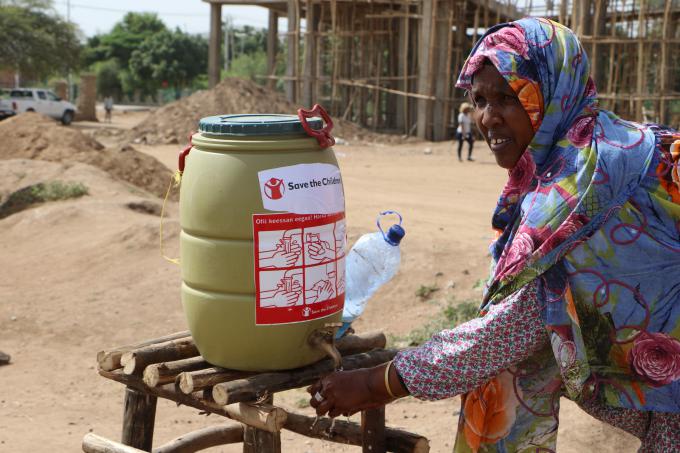Helping Displaced Communities cope with the Coronavirus Pandemic
In 2017Ayisha Mohammed, 50 and a mother of 12 children (eight boys and four girls), had to flee Mieso, her home town, with eight of her twelve children, escaping the ethnic violence in areas bordering Sitti and west hararge zones of Somali and Oromia Regions respectively. Two of her kids were killed in crossfire during the fight. Currently, Ayisha and her husband with six of their children live in a temporary camp for Internally Displaced People (IDPs) at Diredawa youth centre located in Diredawa town where 3,800 internally displaced people reside, most of them children and women struggling to sustain life in a confined compartment built with corogated iron sheet. Ayisha and her family are currently dependant on the food assistance that government and humanitarian agencies provide.
“My husband and I have twelve children. The first four of my children are grownup and live on their own. Three years ago, my husband and I ran away from the violence, carrying eight of our children. We walked for more than five days and nights through the forest and the scorching sun to make it here in Diredawa. I lost two of my children in crossfire during the fight . We left our home empty handed, only with the clothes on our back”.
Before we come to this place, we used to live in Mieso area in Oromia Region. We lost all our belongings and our house was burnt because of the conflict. Before the conflict happened, I used to run a small restaurant where I prepared and sold local cusines to my customers in the area. We are now in a helpless situation. The shelter we live in is too small and poorly furnished for our family of eight. Because of shortage of space, we sometimes sleep out in the open. We also suffer from shortage of food and clean drinking water, and this is mainly difficult for our children to live with. The other biggest challenge here is the lack of latrine in the nearby camp, and we need to walk out to far away places in to the bush and practice open defecation. This is not something girls can do without fear of abuse and feeling embarrassed. Because of the poor hygiene and confined living condition in the camp, many children often get sick, and yet we do not have enough money to take them to the clinic.
Our needs are too many to tell. This time our oriority and urgent need is proper and adequate shelter, sleeping matt, enough food, clean drinking water and kitchen utensils such as cooking pot, plate and bucket. The last time we received the food handout was a month ago and the food handouts are not sufficient to cover the whole month. We wish if we could be provided with more food.
Due to the hot weather here and the small size of our shelter, suffocation is a norm and it is difficult to stay in for a long time. Because of this, we are worried that the Coronavirus could easily spread here in our camp and affect us. We are very grateful to Save the Children for providing us with water storage container and hand washing gels that we use to wash our hands and protect ourselves from the virus. On behalf of my community, I would like to take this opportunity to ask government and supporters to continue to help us until the situation improves. We also wish if we could be provided with a start-up financial assistance for us to be able to engage in income-generating activities that could enable us earn sustainable income and improve our livelihood. That will mean we would be self-sufficient .
I want my children to go far with their education and find government employment so they lead a successful life. I do not want to see my children go through what I went through.
In the Sitti zone of Somali Region, Save the Children, through its rapid emergency response programme has distributed 1,000 bottles (500ml) of hand washing gels and 500 pieces of water container to Internally Displaced People settled at the IDP camp and other vulnerable community members in Diredawa town, Ethiopia. This support has enabled displaced people and host communities to regularly wash their hands and prevent the spread of the Coronavirus.
 Ethiopia
Ethiopia 